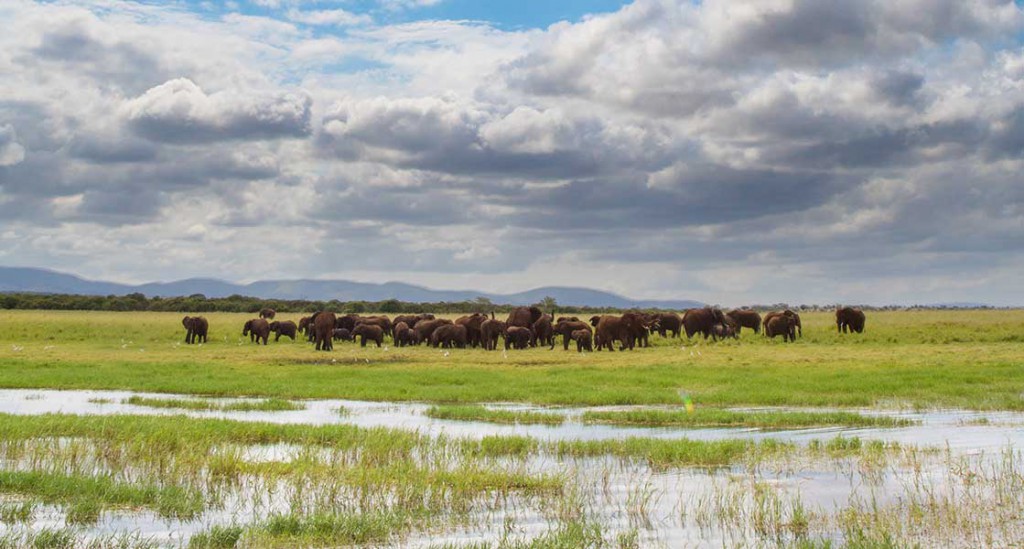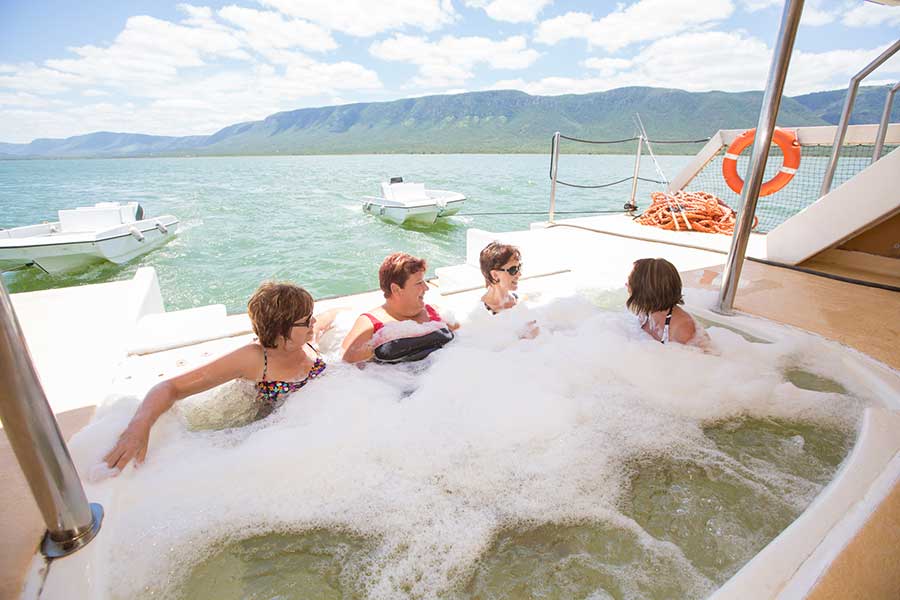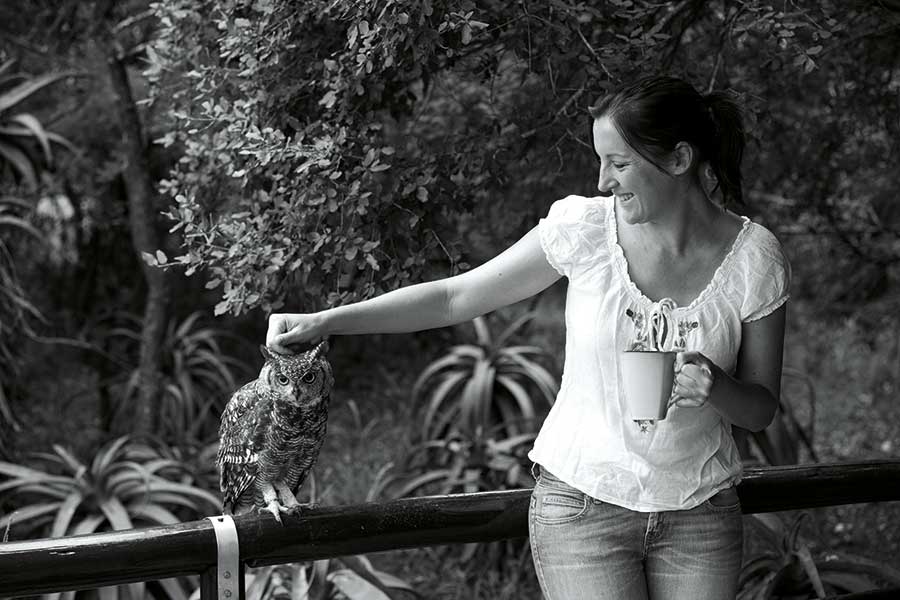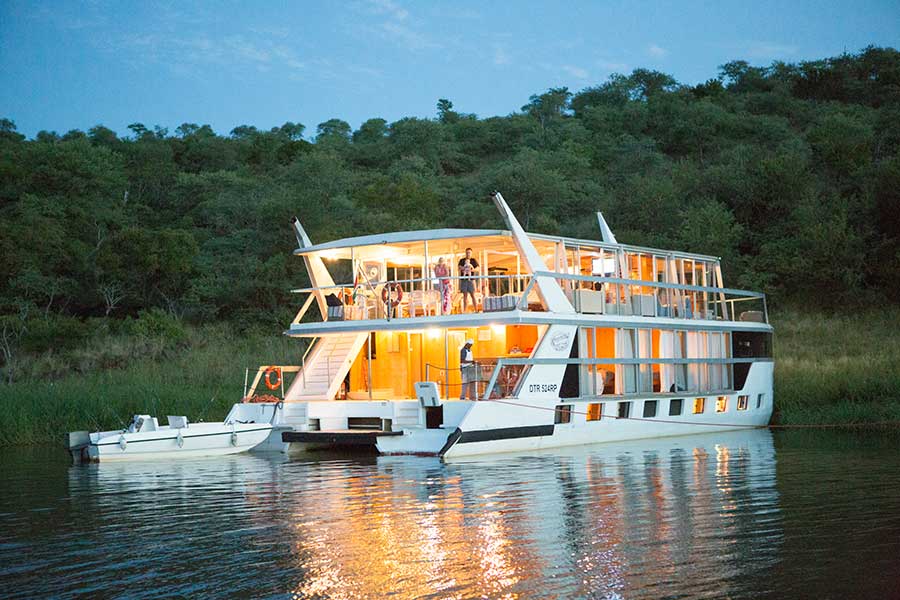Guide to Lake Jozini
At the foot of the Lebombo mountains, just south of Swaziland, lies a destination that not only resembles Zimbabwe’s Lake Kariba, but also rivals it in terms of activities and accommodation. Villiers Steyn and Tabby Mittins soaked up the sun on Lake Jozini.
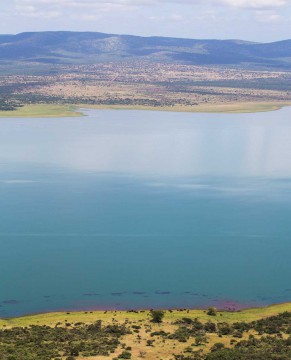 The calm waters of Lake Jozini. ‘She’d hooked a 3,5-kilogram tiger!’ Bramson Chihota, captain of the Shayamanzi II houseboat on Pongolapoort Dam, told his fish tale with a grin.
The calm waters of Lake Jozini. ‘She’d hooked a 3,5-kilogram tiger!’ Bramson Chihota, captain of the Shayamanzi II houseboat on Pongolapoort Dam, told his fish tale with a grin.
‘She cried tears of joy as she reeled it in.’
The assembled company of avid fishers grinned along with him, but when he started using words like ‘spoons’ and ‘spinners’, I lay back on the deck and let the ‘fisherspeak’ continue over my head.
It was our last day on the houseboat and I was starting to feel a lot like the lazyuphongolo, or python, from which the long, grey Pongola River that feeds the fat-bellied dam gets its name. Also called Lake Jozini – an unofficial moniker adopted by the lodges along its edge – this 16000-hectare dam in northeastern KwaZulu-Natal is a popular fishing destination that was once surrounded by crop and livestock farms. Now, it’s bordered predominantly by protected wildlife areas: Ezemvelo KZN Wildlife’s Phongolo Nature Reserve in the north and south, and privately owned Pongola Game Reserve to the west.
I thought back to a conversation I’d had a few days earlier with Lindy Blevin, general manager of family owned Shayamoya Tiger Fishing and Game Lodge.
‘Phongolo is the oldest conservation area in the country – Paul Kruger proclaimed it in 1894,’ she explained over a drink on the lodge’s hillside deck overlooking Lake Jozini’s shores.
Politics, war and the notorious tsetse fly altered its shape, size and occupants over the years, yet today it sits tucked against the Swaziland border with healthy populations of antelope and plains game.
‘Look! Elephants!’ someone in our group on the boat shouted – at last, a language I speak.
Sure enough, a herd of 60-odd pachyderms ambled along a grassy bank not far off. We could easily have been game-viewing on Botswana’s Chobe River, but with northern KZN’s Lebombo mountains behind us we could only be in South Africa.
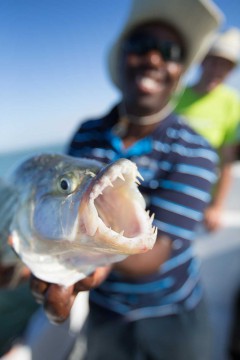 You’ll struggle to find a better place in South Africa to catch tiger fish.
You’ll struggle to find a better place in South Africa to catch tiger fish.
Lake Jozini brings to mind a number of major African destinations. With its booming tiger-fish population it’s most often compared to Lake Kariba in Zimbabwe and, at least in terms of fishing, some have even likened it to the Zambezi or Okavango Delta, but without the wild essence of either. The most notable difference, however, is the time it takes to get there – Lake Jozini is only half a day’s drive from Gauteng.
The elephants we’d spotted were one of two herds on Pongola Game Reserve, a property owned and run by private individuals who have done away with crops, traded cattle for game and turned to eco-tourism. In just a few decades, large plots of land once covered with sugar cane, cotton and cows have become some of the most scenic game-viewing areas in the country.
‘It’s so diverse – we’ve got the water, the mountains, the bush, the animals and the history,’ said Lindy, whose father built the Shayamanzi houseboats in the style of those on Kariba.
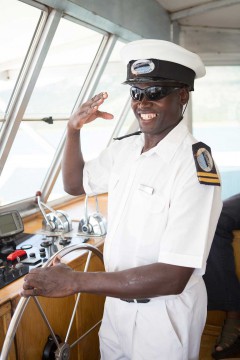 The only thing bigger than Shayamanzi captain Bramson Chihota’s smile is his personality.
The only thing bigger than Shayamanzi captain Bramson Chihota’s smile is his personality.
The animals around Lake Jozini, elephants and buffalo in particular, are so accustomed to fishing activity that game-viewers on the water can get within spitting distance without causing a stir. Game-viewing from your own vehicle on Phongolo Nature Reserve, or from the back of a safari vehicle on Pongola Game Reserve, is no less rewarding and, unlike a drive through Kruger National Park (where you can drive for hours in some areas and see very little), great sightings are virtually guaranteed along Lake Jozini’s shore as animals gather to feed and bathe.
Altogether, the dam and reserves form a protected area of more than 30000 hectares; a tiger-fishing, game-viewing, birding Mecca encompassing the best of dam, river, subtropical savanna and mountain scenery. In fact, the knowledge that there was still so much left to explore was the only reason I was happy to slither off my deckchair and back onto dry land.
The local elephant herds spend much of their time feeding, drinking and bathing along the lake’s shoreline.
Things to do at Lake Jozini
You can drive nearly three quarters of the way around Lake Jozini in under an hour, so it’s easy to use one lodge as a base and do various activities on different properties.
1. Track a rhino on foot
Highly recommended! Experience the thrill of walking in the fresh footprints of a wild rhino with one of Pongola Game Reserve’s certified trackers, who will get you close enough to count the oxpeckers on its back. Excursions depart from Mvubu River Lodge, but are not exclusive to guests at the lodge. Price: From R350 a person for three hours (groups of two to eight only)
Contact: Tel 034 435 1123, website
2. Spoil yourself at a spa
Escape the sun for a morning’s pamper at Mvubu Spa, which overlooks the lush, winding Pongola. Enjoy all sorts – from a manicure to a full body Swedish massage. Open to outside guests, pre-bookings essential.
Price: Prices vary (from R160 to R550 depending on the treatment)
Contact: Tel 083 320 0358, website
3. Sip sundowners on the lake
If you’re not staying at a lodge with its own boats, book a sunset cruise with Shayamoya. Two gentle hours of G&T-sipping on a covered 12-seater boat, while spur-winged geese, Goliath herons, giraffes, hippos and a myriad other bird and game species pass by.
Price: From R300 a person for three hours, including a short game drive before and after the cruise (groups of two to 12 only)
Contact: Tel 034 435 1110, website
The Shayamanzi houseboats aren’t only about fishing and game-viewing, but also relaxation.
Accommodation at Lake Jozini
1. Phonogolo Nature Reserve campsite
Camp on the water’s edge or further back into the bush on one of 20 spacious campsites, each with a braai area, bin and power point. Watch out for grazing hippos when you walk to any of the five basic ablution blocks, which have flush toilets and hot water but no toilet paper. Chances are you’ll fall asleep to the sound of water thick-knees, only to be woken up by everyone’s favourite African call, the fish-eagle.
Price: From R80 a person a night and R30 a vehicle a day, with a maximum of six people per stand.
Contact: Tel 034 435 1012, website
Nandi the spotted eagle-owl is the star of the show at Shayamoya.
2. Shayamoya Bush camp
Shayamoya is a rustic and secluded self-catering bush camp built around the biggest tamboti tree you’ll ever see, with a sociable braai area, open-plan kitchen and four comfortably furnished two-sleeper dome tents. Everything is gas or solar powered, the water is hot and the loos flush. A 4×4 isn’t necessary, but you’ll need a raised vehicle.
Price: From R300 a person a night (min four people, max eight).
Contact: Tel 034 435 1110, website
If you’re a sucker for campfires, Shayamoya Bush Camp is the place for you.
3. Inyati Lodge
This spot has the best views of the lot! Inyati Lodge is an upmarket self-catering bush lodge, complete with swimming pool and fully equipped kitchen. Kick back, relax on your private balcony and look for nyala, buffalo and elephant along the Pongola below. You can also arrange a meal or two at the neighbouring Mvubu River Lodge (which has an equally superb view and is only five minutes away) or a beauty treatment at Mvubu Spa. The camp sleeps a maximum of nine people in four wooden cabins.
Price: From R395 an adult, with a minimum daily rate of R2 370.
Contact: Tel 034 435 1123, website
4. Shayamoya tiger fishing and game lodge
A family farm since 1975, Shayamoya is renowned for their comfortable wood, wicker and white four-star rooms, five-star food and hospitality, and an incredible view from its bar and deck. Keep an eye and an ear out for Nandi, the resident spotted eagle owl, who might stop by your room for a visit. The three-course Chef’s Choice dinner is well worth it.
Price: B&B from R650 a person a night sharing.
Contact: Tel 034 435 1110, website
5. White elephant safari lodge
Set on a low rise overlooking bushveld, the lake and the distant mountains, White Elephant allows guests to get involved with conservation-based research by tracking and monitoring the reserve’s rhino and elephant populations. The main house has an uber-comfortable colonial feel, and the concrete and canvas luxury safari tents are opulent yet unpretentious.
Price: From R1 938 a person a night, including accommodation, two activities and four meals a day.
Contact: Tel 034 413 2489, website
6. Shayamanzi Houseboats
Built to the same design as many of Lake Kariba’s houseboats, Shayamanzi I (sleeps up to 16) and Shayamanzi II (sleeps up to 24) were the first of their kind in South Africa. Each houseboat has a spa bath, permanently manned bar and enough comfortable sofas and deck chairs for group siestas. Smaller tender boats are used for early-morning and late-afternoon fishing, game-viewing and birding trips along the edge of the lake.
Price: Rates vary according to group size and season.
Contact: Tel 034 413 2299, website
Every evening, the Shayamanzi houseboats moor at a different scenic spot on the shoreline.
Plan your holiday
When to visit?
Tiger-fishing is best between September and March when the water is clear and warm, but the run-off from summer downpours (especially during December and January) affects water clarity and tends to reduce the number of bites.
Game viewing is good all year round.
Mind the heat. If you don’t like to sweat, avoid the region from November to February when it gets uncomfortably hot and humid. The temperatures between April and August are very pleasant.
How long should you stay?
To experience everything Lake Jozini has to offer, including a couple of nights on a houseboat, you need at least five nights. Give yourself a week to be on the safe side.
Malaria risk
Lake Jozini is a low-risk malaria area, but mosquitoes are still plentiful, so don’t forget the mozzie spray.
Getting to Lake Jozini
From Johannesburg, take the N17 to Ermelo before getting onto the N2 to Pongola via Piet Retief. Continue south on the N2 for about 30km to reach the northern tip of the lake (about 450km and five hours). Although years of roadworks have drastically improved road conditions between Piet Retief and Pongola, you should still be very wary of cattle that stray into the road.
From Durban, take the N2 approximately 10 km past Mkuze via Empangeni to the lake’s southern tip (about 320km and three-and-a-half hours).
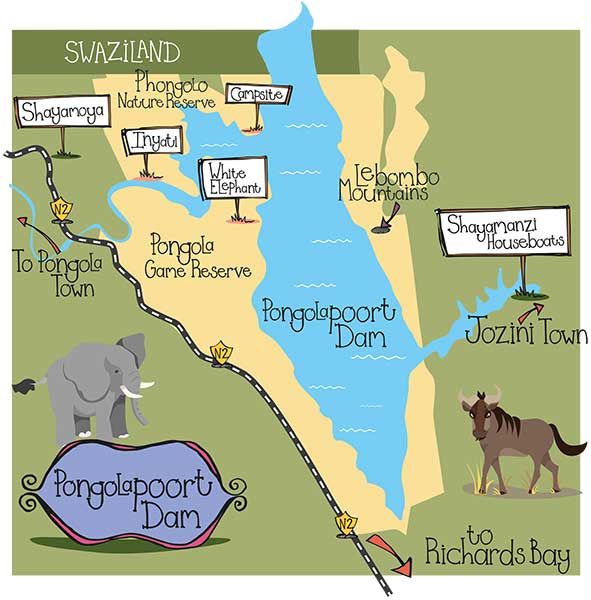
| More info on the town of Jozini | More info on the Elephant Coast area |
Book your accommodation right here on ShowMe.
You can find the top hotels, lodges and Airbnb establishments conveniently placed on the map below. All you need to do is click on the place that’s conveniently located and within your budget and then make a booking. What could be easier?
If the map is not where you want to be, click on the ShowMe Pin and then enter the exact name of the location and the map will adjust accordingly.



